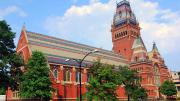As Harvard and other educational institutions have honed their admissions and hiring policies to make their communities more diverse along multiple dimensions, they have come to focus recently on “inclusion”: trying to ensure that all members of their more heterogeneous populations actually feel that they belong, fully and comfortably, within those communities. President Drew Faust has sounded this theme in Morning Prayers addresses (most recently, at the opening of this academic year), among other occasions. Following publication of the final report of the College’s working group on diversity and inclusion, Faust in September announced the creation of a University-wide “Task Force on Inclusion and Belonging” that would consider how to strengthen inclusivity and a sense of belonging among staff, faculty, and students in the Harvard community at large.
The group task force—co-chaired by Conant University Professor Danielle Allen, director of the Edmund J. Safra Center for Ethics; Ford Foundation professor of democracy and citizenship Archon Fung, of the Harvard Kennedy School; and vice president of campus services Meredith Weenick—has spent the first eight months of its estimated 18-month timetable engaged in what Fung calls a very thorough “listening and learning” stage, and anticipates maintaining this posture for the majority of its remaining time. Much of this learning has taken place in public meetings with various schools and through outreach to business units and staff organizations, like information technology and human resources, to gain perspectives on the state of diversity and inclusion at Harvard.
“In order for us to make good on the promises of diversity, it is important that the campus support the academic, social, and professional integration of this community,” says Allen. To pursue its fact-finding across the University, the 35-member task force has divided itself into five initial sub-committees: academic resources, fabric of the institution, organizational structure, demographics, and outreach. A sixth subcommittee, added in January, will study how Harvard makes use of survey data—indicating another avenue for probing what can be sensitive feelings comprehensively.
The Afternoon of Engagement, hosted by the task force on Wednesday, April 5, in Sanders Theatre from 2:00 to 4:30 p.m., will begin a pivot from this diagnosing and listening phase, and thus is a step closer toward formulating and building out the recommendations to be made by next spring. Allen says she is excited about the event “because it’s a chance to have participants from all corners of the University. Previous listening sessions have all been school-specific.” Now the project moves to a larger stage (literally and figuratively), and may begin to focus community attention on its work more closely.
The Wednesday event will begin with a brief introduction by Faust. Then students and faculty and staff members will take the stage to tell their own narratives of inclusion and belonging (or feelings of exclusion) at Harvard. These stories were rehearsed and developed with help from The Moth (a nonprofit group dedicated to the art and craft of story-telling). Next UPS Foundation professor of service management Frances Frei, whose research on diversity and organizational performance has often been tapped within Harvard, will lead the audience in a trust-building exercise by pairing up participants and asking them to explore the underpinnings of their interpersonal relationships. The remaining 70 minutes of the afternoon will be an interactive workshop. Participants will be split into groups of four to discuss feelings of belonging—positive and negative—at Harvard. These sessions will also include brainstorming time for participants to suggest ways in which the administration, faculty, and students can deepen inclusion on campus.
[Updated March 31, 2017, 10:45 A.M and 1:25 P.M.] Scribes will be walking through the event to capture ideas from the brainstorming session; the University indicates that the task force intends in late April to report to the community what it learned at the afternoon session. These conversations will be incorporated into future work that will culminate at a task force retreat in September. Weenick is especially optimistic about the impact the task force’s recommendations will have on staff: “Students rotate through various degree programs, but academic personal and staff stay much longer, and they make up the backbone of this culture.”
One development that attendees can expect from the Afternoon of Engagement is the announcement of a new Web tool—the Solution Space—where students, faculty, and staff members will be able to post about their experiences with inclusion and belonging at Harvard. (It is modeled after a similar concept at MIT.) Posters must have a Harvard Key to participate, but they will have the option to post anonymously. The task force hopes that such a forum, enabled by technology and allowing for anonymity, can become a productive space for discussion.









